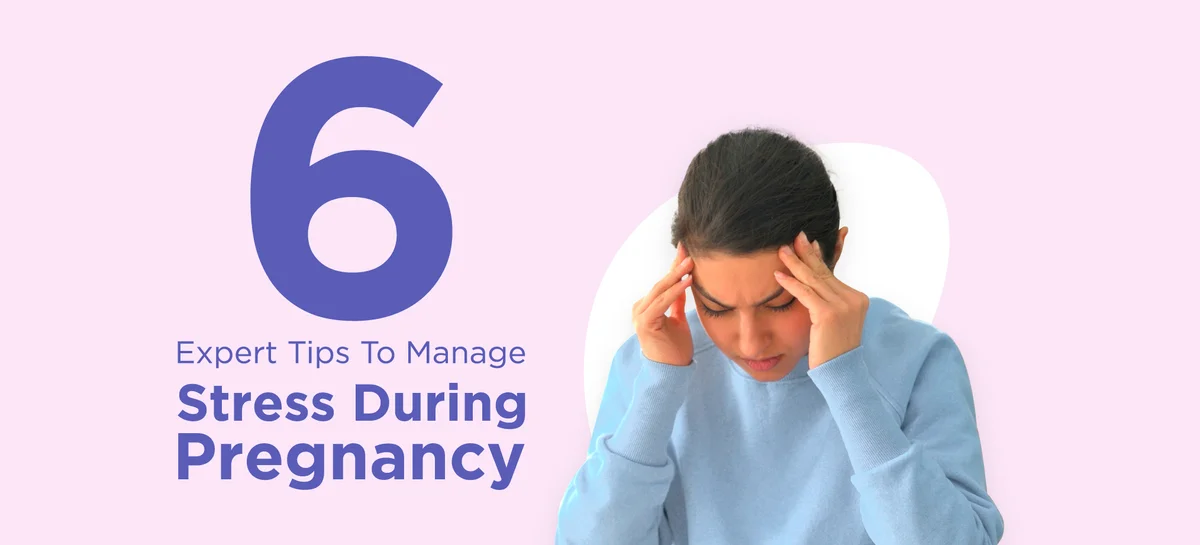- Home
- Blog
- Women Care
How To Manage Stress During Pregnancy?
Women Care
How To Manage Stress During Pregnancy?
By Apollo 24|7, Published on- 23 March 2023, Updated on -21 June 2023
Share this article
0
0 like

It’s common to feel stressed during pregnancy as it’s a time in your life when many things change physically, emotionally, and mentally, all at once. Many of these changes can be overwhelming and can add to your stress levels. Notably, high-stress levels that continue for a prolonged period can cause many health problems, such as high blood pressure and heart diseases. During pregnancy, stress can result in an increased risk of premature delivery or a low birth-weight baby. These babies are at an increased risk of developing various health problems later in life. Read on to learn about some useful tips to manage stress during pregnancy.
1. Focus on Breathing Deeply
Stress can significantly affect your breathing, causing you to take shallower, shorter breaths. This decreases the oxygen level in your body significantly. Whenever you feel stressed out, lie down or take a seat, close your eyes, and take deep breaths. Make sure to breathe in through the nose and breathe out through the mouth and focus on the rise and fall of the chest.
2. Give Yourself Time to Rest
Falling asleep is not very easy during pregnancy. When you don’t rest properly, your mind and body can quickly become exhausted, leading to a rise in negative emotions and thoughts. Pregnancy is a time when your body goes through plenty of changes and not getting enough sleep can increase your stress levels. Try getting in at least 7-9 hours of sleep every night. Try adopting some pre-bedtime habits that can help you fall asleep. For instance, you can choose to take a warm bath, sip a cup of herbal tea, avoid any screen time, and listen to calming music just before going to bed.
3. Try Exercise and Meditation
Not only does regular exercise improve your physical health but also boosts your mental health. Exercising releases feel-good hormones called endorphins into your body. These chemicals elevate your mood and provide relief from the symptoms of anxiety and depression. Simply heading out for a walk at a moderate pace or practising easy yoga poses can provide you with a boost of endorphins. You can also try meditation and mindfulness to relieve stress and anxiety.
4. Eat Healthy
Eating regular meals prevents your blood sugar from dropping, which can make you tired and irritable. It’s not very easy to eat when you are suffering from nausea or morning sickness. However, it’s vital to find something healthy that you can bear eating, such as dry toast, or salty crackles. While it’s alright to treat yourself to some snacks every now and then, it’s essential to ensure that the majority of your diet is made up of healthy, nutrient-rich food items to make you feel strong both mentally and physically.
5. Stay Hydrated
It’s essential to drink at least eight glasses of water every day, particularly during pregnancy. You can also fill up on other fluids like fruit juice, milk, and herbal tea. Notably, it’s advisable to not exceed the caffeine intake by more than 200 mg. Also, it’s highly recommended to abstain from alcohol completely. You can try non-alcoholic mocktails instead if you are in the mood for something different and delicious.
6. Talk to Someone
Often, simply sharing your worries or feelings with someone can help you feel a lot better. You can choose to talk to your parents, partner, friends or other pregnant women, who might be able to relate with you or even offer some advice about how to relieve stress. You can also keep a journal and write about what you are feeling. Journaling your journey can help you calm down efficiently.
It is advisable to consult your doctor before trying out any new food or lifestyle practices in your daily routine. If you feel like you’ve tried everything to keep your stress levels under control but nothing is working, then it’s a good idea to see a therapist. A qualified professional may be able to help you and ensure good mental health during pregnancy. For more questions,
Consult Apollo's Expert Gynaecologists
Medically reviewed by Dr Sonia Bhatt.
Services
Women Care
Leave Comment
Services
Recommended for you

Women Care
Can Hypothyroidism Affect Your Chances Of Getting Pregnant?
Wondering how hypothyroidism affects your chances of conceiving and carrying a healthy pregnancy? This article discusses how low thyroid hormone levels can affect ovulation and menstruation, making conception challenging. Additionally, it highlights the risks of uncontrolled hypothyroidism during pregnancy and emphasises the importance of proper management and medical care for a successful pregnancy and healthy baby.

Women Care
These 3 Factors Can Cause Impotence in Women
Impotence in women could be the result of physical, psychological, or hormonal issues. However, the most possible causes include diabetes, hypertension, depression, and menopause. Discussing problems with your partner and your healthcare provider can help tackle this situation effectively.

Women Care
Know the Body Pains Every Woman Goes Through
Explore the various types of body pain that women commonly experience, including menstrual pain, sexual pain, pregnancy pain, ovarian pain, and joint pain. Discover the causes and some tips to ease each type of pain and improve overall well-being. #ApolloPharmacy #WomensHealth #BodyPain
Subscribe
Sign up for our free Health Library Daily Newsletter
Get doctor-approved health tips, news, and more.


